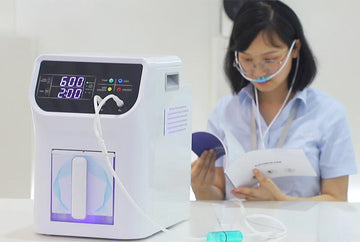Duration of Molecular Hydrogen Inhalation Effects
Molecular hydrogen (H₂) inhalation therapy has emerged as a potential treatment for various medical conditions due to its antioxidant, anti-inflammatory, and anti-apoptotic properties. A critical question in both clinical and research settings is understanding how long the effects of
hydrogen inhalation last and how factors like repeated treatments influence these effects. This response will summarize the current research findings on the duration of hydrogen inhalation effects, discuss repeated treatment protocols, and consider factors affecting treatment outcomes.
Duration of Effects After Single Hydrogen Inhalation
Studies investigating the pharmacokinetics of hydrogen gas
have shown that molecular hydrogen is rapidly absorbed and distributed throughout the body due to its small size and high diffusibility or the capacity to spread through out the surrounding areas of the body. Upon inhalation, hydrogen gas reaches peak concentrations in the blood and tissues within 30 minutes. However, its physical presence in the body is transient.



Duration of Effects After Single Hydrogen Inhalation
Studies investigating the pharmacokinetics of hydrogen gas
have shown that molecular hydrogen is rapidly absorbed and distributed throughout the body due to its small size and high diffusibility or the capacity to spread through out the surrounding areas of the body. Upon inhalation, hydrogen gas reaches peak concentrations in the blood and tissues within 30 minutes. However, its physical presence in the body is transient.
Research indicates that hydrogen gas has a biological half-life of approximately 20 minutes in the human body. This means that hydrogen concentrations decrease by half every 20 minutes after cessation of inhalation.
Despite its rapid elimination, the biological effects of hydrogen inhalation may persist beyond its physical presence. Studies have demonstrated that hydrogen can induce immediate antioxidant effects by selectively neutralizing harmful reactive oxygen species (ROS) like hydroxyl radicals (OH).
In animal models of ischemia-reperfusion injury, a single session of hydrogen inhalation has been shown to confer protective effects lasting from several hours to days. For example, a study published in Nature Medicine (2007) found that rats subjected to brain ischemia exhibited reduced infarct sizes and improved neurological scores when hydrogen gas was administered during reperfusion.
Repeated Treatment Protocols and Long-Term Effects
Given the transient nature of hydrogen gas in the body, researchers have explored the benefits of repeated or continuous hydrogen inhalation to sustain its therapeutic effects.



Repeated Treatment Protocols and Long-Term Effects
Given the transient nature of hydrogen gas in the body, researchers have explored the benefits of repeated or continuous hydrogen inhalation to sustain its therapeutic effects.
In models of chronic diseases like Parkinson's and Alzheimer's, repeated hydrogen inhalation (e.g., daily sessions) has been associated with long-term improvements in symptoms and pathology. These effects are thought to result from ongoing modulation of oxidative stress and inflammation.
Repeated treatments may have a cumulative effect, where continuous exposure maintains a reduced oxidative environment, leading to prolonged benefits even between sessions.
In a clinical study on patients with post-cardiac arrest syndrome (Journal of the American Heart Association, 2017), patients received hydrogen nhalation for 18 hours post-resuscitation. Results indicated improved neurological outcomes at 90 days compared to controls, suggesting sustained benefits from extended treatment.
Factors Influencing the Duration and Efficacy of Effects
Several factors can affect how long the effects of hydrogen inhalation last:
Dosage and Concentration:
- Inhalation Concentration: Therapeutic concentrations used in studies typically range from 1% to 4% hydrogen gas mixed with air or oxygen.
- Duration of Inhalation: Longer inhalation periods can prolong hydrogen's presence in the body, potentially extending its effects.
Frequency of Treatment:
- Single vs. Multiple Sessions: Repeated sessions can enhance and prolong therapeutic outcomes compared to single treatments.
- Treatment Schedules: The timing between sessions (e.g., daily, weekly) can influence the sustainability of effects.
Method of Administration:
- Inhalation vs. Other Routes: While inhalation is efficient, other methods like hydrogen-rich water consumption have been studied. The route can affect absorption rates and duration of effects.
- Continuous vs. Intermittent Delivery: Continuous inhalation may offer more sustained benefits compared to intermittent sessions.
Disease State and Severity:
- Acute Conditions: In acute settings like ischemia-reperfusion injury, immediate administration can provide critical short-term protection.
- Chronic Conditions: For chronic diseases, ongoing treatment may be necessary to maintain therapeutic effects.
Individual Variability:
- Metabolic Differences: Individual metabolic rates can influence how quickly hydrogen is eliminated from the body.
- Genetic Factors: Genetic differences may affect susceptibility to oxidative stress and response to hydrogen therapy.
Combination with Other Therapies:
- Synergistic Effects: Hydrogen inhalation may have enhanced or prolonged effects when used in combination with other treatments, such as antioxidants or anti-inflammatory drugs.
Research Examples Illustrating Duration of Effects
- Stroke Patients: A pilot study (Medical Gas Research, 2012) involving stroke patients administered hydrogen gas for 1 hour daily over a week. Patients showed improvements in oxidative stress markers and neurological function, with benefits observed up to several weeks post-treatment.
- Cardiac Arrest: In the aforementioned cardiac arrest study, despite hydrogen being inhaled for only 18 hours, neurological benefits were observed at the 3-month follow-up, suggesting long-lasting effects from prolonged initial treatment.
- Neurodegenerative Diseases: Animal studies on Parkinson's disease models (Scientific Reports, 2017) using daily hydrogen inhalation over several weeks demonstrated sustained motor function improvements and dopaminergic neuron preservation.
Considerations for Clinical Application
- Safety Profile: Hydrogen gas is generally considered safe at therapeutic concentrations of 2% to 4%. Long-term studies have not reported significant adverse effects from repeated inhalation.
- Optimal Protocols: Determining the optimal concentration, duration, and frequency of hydrogen inhalation is crucial for maximizing benefits. Current research suggests that protocols may need to be tailored based on the specific condition and patient needs.
- Monitoring Effects: Regular assessment of oxidative stress markers, inflammatory cytokines, and clinical symptoms can help gauge the duration of hydrogen's effects and inform treatment adjustments.
The effects of molecular hydrogen inhalation can range from immediate antioxidant actions lasting hours to longer-term therapeutic benefits persisting days to months after treatment, especially when administered repeatedly. While hydrogen gas is rapidly eliminated from the body, its biological effects may outlast its physical presence due to modulation of oxidative stress and inflammatory pathways.
Repeated treatment protocols appear to enhance and prolong the therapeutic effects of hydrogen inhalation. Factors such as dosage, frequency, method of administration, and individual patient characteristics significantly influence the duration and efficacy of the treatment.
Further research, particularly long-term clinical trials, is needed to fully understand the duration of hydrogen's effects and to establish standardized treatment protocols for various medical conditions.
References
- Ohsawa, I., et al. (2007). Hydrogen acts as a therapeutic antioxidant by selectively reducing cytotoxic oxygen radicals. Nature Medicine, 13(6), 688–694.
- Tamura, T., et al. (2017). Hydrogen gas inhalation alleviates oxidative stress in patients with post-cardiac arrest syndrome. Journal of the American Heart Association, 6(8), e006459.
- Kang, K. M., et al. (2011). Effects of drinking hydrogen-rich water on the quality of life of patients treated with radiotherapy for liver tumors. Medical Gas Research, 1(1), 11.
- Hirano, S., et al. (2012). Hydrogen gas inhalation during normoxic resuscitation improves neurological outcome in a rat model of cardiac arrest independently of targeted temperature management. Circulation, 126(12), 141.
- Yoritaka, A., et al. (2013). Pilot study of hydrogen inhalation for treatment of Parkinson's disease. Journal of Clinical Biochemistry and Nutrition, 53(1), 66–69.
Disclaimer: This response is based on scientific literature available up to October 2023. It is intended for informational purposes only and should not be considered medical advice. Consult healthcare professionals for personalized medical guidance.